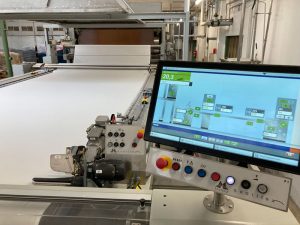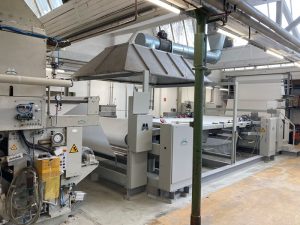
Family-owned German home textiles leader boosts production with a complete finishing line upgrade.
TW Special Report
For leading European textile manufacturers, adapting quickly to changing and highly uncertain market conditions has long been a necessity. The need for flexibility has only been intensified since the onset of the Covid-19 pandemic.
Wülfing GmbH, founded in 1885, is one of the oldest but also the most modern home textiles companies in Germany, with its main weaving and finishing operations located in Borken, North Rhine-Westphalia, and a further jacquard weaving mill in Steinfurt, as well as a making up and packaging plant in the Czech Republic.
The family-owned company’s extensive home textiles portfolio — spearheaded by the well-known Dormisette brand of bed linen — is supplied both to a wide range of retailers, discounters and catalogues, as well as to airlines hotels, retirement homes and other public institutions.
In addition, Wülfing is also a specialist in African damask fabric weaving at the production site in Steinfurt.
All told, the company has over 500 employees and with 160 weaving machines in continuous operation has an annual capacity of 60 million square meters of cotton fabrics — roughly the area of 8,400 football pitches. In addition 200,000 kilograms (kg) of high quality 95 percent cotton yarns are always in stock, with 15,000 kg processed into fabrics on a daily basis.

Competitive Pressure
“Germany’s textile industry faces strong competitive pressure due to cheap imports from low-wage countries and is characterized by rapid change,” said Gerd Schulte-Mesum, Wülfing’s Borken plant manager. “In order to be successful in this environment, we have to have a high degree of flexibility and innovative strength. This is the only way to react quickly to economic fluctuations and changing customer requirements.
“Our particular strength is in wide-width weaving and the development of customer-specific ranges. We have fully-integrated production in Germany on the most modern machines and flexibility is fundamental to our continued success. The fast-moving market demands ever-increasing innovation, service and the rapid implementation of new ideas.”
Schulte-Mesum also stressed the company’s environmentally-friendly and sustainable production, with 80 percent of the company’s energy generated via its own combined heat and power plant and waste heat recaptured and reused to pre-heat and treat process water.
Digitization is allowing further gains to be made in energy consumption and emissions and in logistics and transportation, the use of double-decker trucks for deliveries halves the number of journeys required.
“Our production in Germany also leads to considerably shorter transport route to our customers in Europe compared to imports from remote countries,” Schulte-Mesum said.
 Monforts Partnership
Monforts Partnership
The Germany-based manufacturer of finishing machines, Monforts, based in Mönchengladbach, has recently partnered with Wülfing on a project that has considerably boosted its productivity.
At its Borken plant, Wülfing has employed a Monforts sanforizing line since 2009 to guarantee the required dimensional stability and shrink-fastness of its high quality bed linen. With a working width of over three meters, the sanforizing process is a central pillar in the production of typical wide-width cotton fabrics for home textiles.
In 2017, the company was able to acquire a second Monforts sanforizing line from another company which, although built in 2005, had been virtually unused. It was overhauled and installed behind a Monforts equalizing frame of a similar age.
“Unfortunately, the two machines had to be operated separately via individual controls and did not represent an integrated unit,” Schulte-Mesum said. “This resulted in deficits in the desired productivity and in the control technology.”
 Wülfing consulted with Monforts on a number of upgrade options and opted for a completely new joint control system to merge the two machines, as well as a new connecting inlet, a tensioning and damping field and a steaming unit.
Wülfing consulted with Monforts on a number of upgrade options and opted for a completely new joint control system to merge the two machines, as well as a new connecting inlet, a tensioning and damping field and a steaming unit.
“Monforts provided a fast and precise erection and commissioning of the technology in spite of the difficult pandemic circumstances,” Schulte-Mesum said. “The result has been an increase in production speeds by 20 percent and enhanced uniformity in fabric width through a much improved guidance system.
“We are also achieving energy savings as a result of the new control and drive technology and operation has been simplified and improved as a result of the unified control. We benefit from simplified access for maintenance work such as the grinding of the rubber blanket, but most of all we have greatly improved our flexibility and now have two almost identical Monforts sanforizing lines.”
Monforts has been able to assist its customers through the difficult Covid-19 pandemic in a number of ways — not least with its MORE — Monforts Original Replacement Equipment — program.
The Monforts commitment to customer service is based on four principles — helpful, accurate, fast and reliable. The company has established a reputation for quickly and efficiently dispatching spares and components where they’re needed worldwide.
 Monforts machines are known for their robustness and long service life, but major advances in digital technology mean that there are now significant gains to be made in the retrofitting of the latest automatic drives and control systems to machines, going far beyond the basic replacement of spare parts.
Monforts machines are known for their robustness and long service life, but major advances in digital technology mean that there are now significant gains to be made in the retrofitting of the latest automatic drives and control systems to machines, going far beyond the basic replacement of spare parts.
“It’s been a pleasure to work with the team at Wülfing on this project, which demonstrates what is possible in the modification and upgrading of Monforts machines already in operation,” added Thomas Päffgen, Monforts Area Sales Manager.
August 13, 2021




